Author Photo And Bio
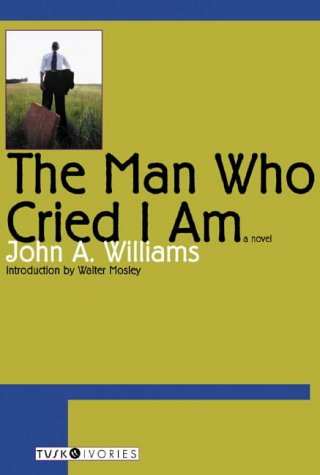 1. The Man Who Cried I Am by John A.Williams (1967). Generally recognized as one of the most important novels of the tumultuous 1960s, The Man Who Cried I Am vividly evokes the harsh era of segregation that presaged the expatriation of African-American intellectuals. Through the eyes of journalist Max Reddick, and with penetrating fictional portraits of Richard Wright and James Baldwin, among other historical figures, John A Williams reveals the hope, courage, and bitter disappointment of the civil-rights era. Infused with powerful artistry, searing anger, as well as insight, humanity, and vision, The Man Who Cried I Am is a classic of postwar American literature.
1. The Man Who Cried I Am by John A.Williams (1967). Generally recognized as one of the most important novels of the tumultuous 1960s, The Man Who Cried I Am vividly evokes the harsh era of segregation that presaged the expatriation of African-American intellectuals. Through the eyes of journalist Max Reddick, and with penetrating fictional portraits of Richard Wright and James Baldwin, among other historical figures, John A Williams reveals the hope, courage, and bitter disappointment of the civil-rights era. Infused with powerful artistry, searing anger, as well as insight, humanity, and vision, The Man Who Cried I Am is a classic of postwar American literature.
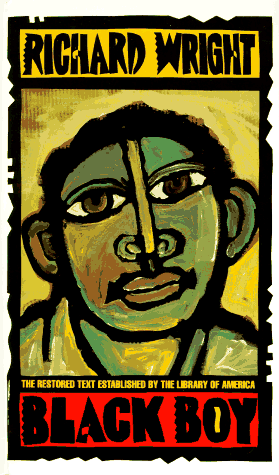 2. Black Boy by Richard Wright (1945). Richard Wright grew up in the woods of Mississippi, with poverty, hunger, fear, and hatred. He lied, stole, and raged at those around him; at six he was a "drunkard," hanging about taverns. Surly, brutal, cold, suspicious, and self-pitying, he was surrounded on one side by whites who were either indifferent to him, pitying, or cruel, and on the other by blacks who resented anyone trying to rise above the common lot. Black Boy is Richard Wright's powerful account of his journey from innocence to experience in the Jim Crow South. It is at once an unashamed confession and a profound indictment—a poignant and disturbing record of social injustice and human suffering.
2. Black Boy by Richard Wright (1945). Richard Wright grew up in the woods of Mississippi, with poverty, hunger, fear, and hatred. He lied, stole, and raged at those around him; at six he was a "drunkard," hanging about taverns. Surly, brutal, cold, suspicious, and self-pitying, he was surrounded on one side by whites who were either indifferent to him, pitying, or cruel, and on the other by blacks who resented anyone trying to rise above the common lot. Black Boy is Richard Wright's powerful account of his journey from innocence to experience in the Jim Crow South. It is at once an unashamed confession and a profound indictment—a poignant and disturbing record of social injustice and human suffering.
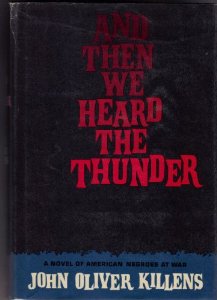 3. And Then We Heard the Thunder by John Oliver Killens (1962). And Then We Heard the Thunder follows the dreams, lies, and anguish of black World War II GI Solomon Sanders during his tour of duty in Indochina, Australia, and the United States. Harvard-trained in the law and a political moderate, Sanders is married to an upper-middle-class black woman who pushes him to "make something of himself" by becoming an Army officer. Given his credentials, he appears a shoo-in for Officer Candidate School, yet he rejects the opportunity as the vestiges of Jim Crow racism, the strains of war, and his interactions with disgruntled black troops thrust him into black activism. Forced to make common cause with his race rather than with the Army, he and some fellow soldiers write a letter to American newspapers about the poor treatment of blacks in the military. For this outcry, they encounter harassment and further discrimination, resulting in a full-scale battle between black and white troops and a blood-curdling climax to this second novel by acclaimed African American author John Killens.
3. And Then We Heard the Thunder by John Oliver Killens (1962). And Then We Heard the Thunder follows the dreams, lies, and anguish of black World War II GI Solomon Sanders during his tour of duty in Indochina, Australia, and the United States. Harvard-trained in the law and a political moderate, Sanders is married to an upper-middle-class black woman who pushes him to "make something of himself" by becoming an Army officer. Given his credentials, he appears a shoo-in for Officer Candidate School, yet he rejects the opportunity as the vestiges of Jim Crow racism, the strains of war, and his interactions with disgruntled black troops thrust him into black activism. Forced to make common cause with his race rather than with the Army, he and some fellow soldiers write a letter to American newspapers about the poor treatment of blacks in the military. For this outcry, they encounter harassment and further discrimination, resulting in a full-scale battle between black and white troops and a blood-curdling climax to this second novel by acclaimed African American author John Killens.
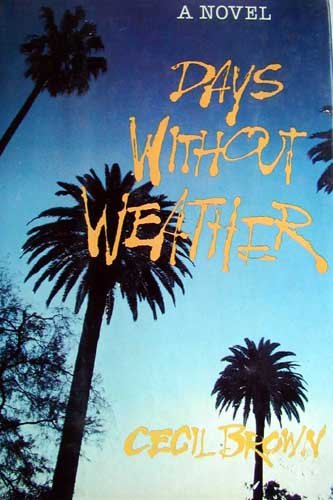 4. Days Without Weather by Cecil Brown (1983). Brown’s lyrical and cynical wit’s shines through in this novel about a Black Los Angeles comedian.
4. Days Without Weather by Cecil Brown (1983). Brown’s lyrical and cynical wit’s shines through in this novel about a Black Los Angeles comedian.
5. The Wig by Charles Wright (1966). This novel tells the story of Lester Jefferson, a young man of great good will, whose repeated attempts to become a part of "The Great Society" are doomed in advance. Aided, thwarted, and confused by numerous, curious companions, Lester conducts his inevitable search for happiness in a series of absurdist misadventures that begin with the transformation of the hair on his head into burnished silken curls. "Charles Wright's Negro world explodes with the crazy laughter of a man past caring,” wrote Conrad Knickerbocker in The New York Times. “His style, as mean and vicious a weapon as a rusty hacksaw, is the perfect vehicle for his zany pessimism. The Wig is a brutal, exciting, and necessary book."
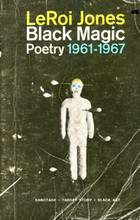 6. Black Magic Poetry 1961-1967 by Amiri Baraka (1967). Baraka is a political artist whose work, especially at this time, sought to portray society and its ills faithfully so that the portrayal would move people to take necessary corrective action. According to the Poetry Foundation, “These poems chronicle Baraka’s divorce from white culture and values while displaying his mastery of poetic technique.”
6. Black Magic Poetry 1961-1967 by Amiri Baraka (1967). Baraka is a political artist whose work, especially at this time, sought to portray society and its ills faithfully so that the portrayal would move people to take necessary corrective action. According to the Poetry Foundation, “These poems chronicle Baraka’s divorce from white culture and values while displaying his mastery of poetic technique.”
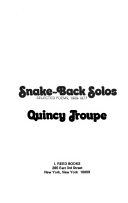 7. Snake-back Solos: Selected Poems 1969-1977 by Quincy Troupe (1978). Troupe won the American Book Award for this collection of poems which displays his energetic, highly syncopated approach that melds contemporary music rhythms—such as rap, jazz, and be-bop—to a “furious rush of images, sometimes jarring, arising from personal experience,” according to critic Tony Perry in the Los Angeles Times. Celebratory, but also cautionary, Troupe’s subjects range from jazz and sports to racism and urban decay.
7. Snake-back Solos: Selected Poems 1969-1977 by Quincy Troupe (1978). Troupe won the American Book Award for this collection of poems which displays his energetic, highly syncopated approach that melds contemporary music rhythms—such as rap, jazz, and be-bop—to a “furious rush of images, sometimes jarring, arising from personal experience,” according to critic Tony Perry in the Los Angeles Times. Celebratory, but also cautionary, Troupe’s subjects range from jazz and sports to racism and urban decay.
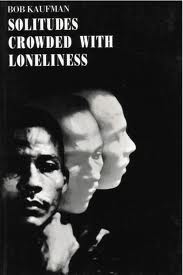 8. Solitudes Crowded with Loneliness: Selected Poems 1969-1977 by Bob Kaufman (1965). Celebrated as an original Beat and "the American Rimbaud," Kaufman promotes a spontaneous, prophetic verse, mixing street talk and jazz with vision. “Solitudes Crowded with Loneliness” assembles ten years' of work, including odes to Charles Mingus, Hart Crane, Ray Charles, and Albert Camus as well as love lyrics, political rants, "Prison Poems," and the prose meditation "Second April."
8. Solitudes Crowded with Loneliness: Selected Poems 1969-1977 by Bob Kaufman (1965). Celebrated as an original Beat and "the American Rimbaud," Kaufman promotes a spontaneous, prophetic verse, mixing street talk and jazz with vision. “Solitudes Crowded with Loneliness” assembles ten years' of work, including odes to Charles Mingus, Hart Crane, Ray Charles, and Albert Camus as well as love lyrics, political rants, "Prison Poems," and the prose meditation "Second April."
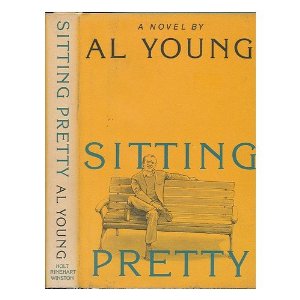 9. Sitting Pretty by Al Young (1976). Spoken, for it seems more grounded in the oral than the written tradition, by SidneyJ. Prettymon, a. k. a. Sitting Pretty, this novel set in the San Francisco Bay Area is rich in local color, authentic, and thoroughly enjoyable. Covering one year in the life of the narrator, the book opens in a down and out hotel where he lives folks such as Miz Duchess, a tough but lovable Cherokee woman who dines on Alpo; Willie G., who goes from working in the junk yard to fashionable security guard at a modem art museum back to the junk yard; Broadway, a flashy young man who ends up busted for cocaine; and the silent and intuitive Professor. As we follow their exploits we watch the narrator’s fights the often humorous fights battle of the bottle. We see him go to jail for unpaid parking tickets and gets bailed out by his lawyer son; establish contact with his wife after years of neglect only to discover that she has developed cancer and become famous pitching T.V. and radio shows. He chases several women along the way while exposing himself to radical black poetry. The action keeps the book going along at a fast clip, but the value of Sitting Pretty is in the narrator's "philosophizin." His insights are grounded in the experience of black America, yet they are universal enough to make this a novel of wide appeal
9. Sitting Pretty by Al Young (1976). Spoken, for it seems more grounded in the oral than the written tradition, by SidneyJ. Prettymon, a. k. a. Sitting Pretty, this novel set in the San Francisco Bay Area is rich in local color, authentic, and thoroughly enjoyable. Covering one year in the life of the narrator, the book opens in a down and out hotel where he lives folks such as Miz Duchess, a tough but lovable Cherokee woman who dines on Alpo; Willie G., who goes from working in the junk yard to fashionable security guard at a modem art museum back to the junk yard; Broadway, a flashy young man who ends up busted for cocaine; and the silent and intuitive Professor. As we follow their exploits we watch the narrator’s fights the often humorous fights battle of the bottle. We see him go to jail for unpaid parking tickets and gets bailed out by his lawyer son; establish contact with his wife after years of neglect only to discover that she has developed cancer and become famous pitching T.V. and radio shows. He chases several women along the way while exposing himself to radical black poetry. The action keeps the book going along at a fast clip, but the value of Sitting Pretty is in the narrator's "philosophizin." His insights are grounded in the experience of black America, yet they are universal enough to make this a novel of wide appeal
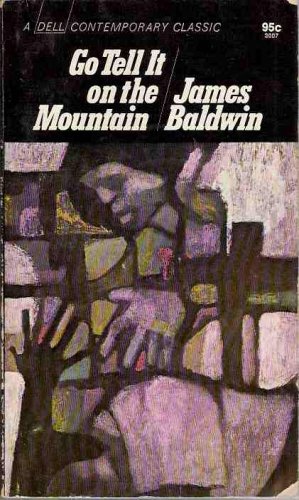 10. Go Tell It On The Mountain by James Baldwin (1953). “Mountain,” Baldwin said, "is the book I had to write if I was ever going to write anything else. “Go Tell It On the Mountain” is Baldwin's first major work, a novel that has established itself as an American classic. With lyrical precision, psychological directness, resonating symbolic power, and a rage that is at once unrelenting and compassionate, Baldwin chronicles a fourteen-year-old boy's discovery of the terms of his identity as the stepson of the minister of a storefront Pentecostal church in Harlem one Saturday in March of 1935. Baldwin's rendering of his protagonist's spiritual, sexual, and moral struggle of self-invention opened new possibilities in the American language and in the way Americans understand themselves.
10. Go Tell It On The Mountain by James Baldwin (1953). “Mountain,” Baldwin said, "is the book I had to write if I was ever going to write anything else. “Go Tell It On the Mountain” is Baldwin's first major work, a novel that has established itself as an American classic. With lyrical precision, psychological directness, resonating symbolic power, and a rage that is at once unrelenting and compassionate, Baldwin chronicles a fourteen-year-old boy's discovery of the terms of his identity as the stepson of the minister of a storefront Pentecostal church in Harlem one Saturday in March of 1935. Baldwin's rendering of his protagonist's spiritual, sexual, and moral struggle of self-invention opened new possibilities in the American language and in the way Americans understand themselves.